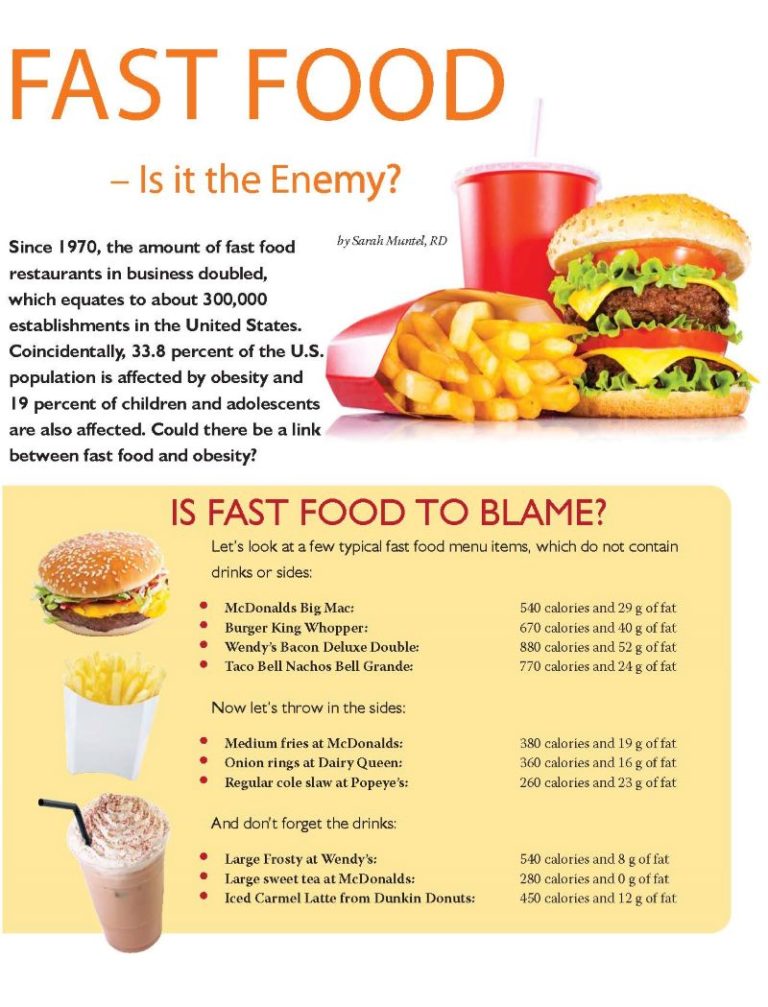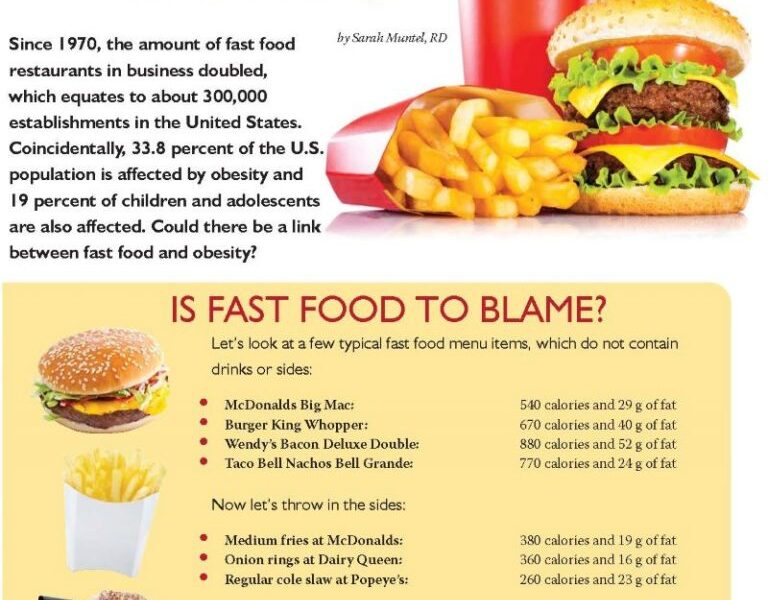How Does Fast Food Affect Obesity
Grasping the harsh reality that obesity can be a life-threatening condition, it becomes vital for us to understand its triggers and means of combating it. One such prominent trigger is the consumption of fast food. This article scrutinizes the formidable link between fast-food consumption and obesity, shedding light on the dangerous effects of frequent indulgence in these seemingly innocuous meals. By understanding the nuances of this issue, we aim to foster informed dietary choices and promote healthier ways of living.
Understanding Obesity
Definition of Obesity
When we refer to obesity, we are discussing a health condition whereby there is an excessive accumulation of body fat to the extent that it may have a negative impact on one’s health. Obesity is generally measured using the Body Mass Index (BMI), where a person with a BMI of 30 or more is considered obese.
Causes of Obesity
The foundations of obesity are complex and intertwined. At its core, obesity is caused by an energy imbalance where we consume more calories than we burn. However, this energy imbalance can be influenced by various factors, such as genetics, environmental factors, certain medical conditions, and most importantly, our eating and activity habits.
Impacts of Obesity on Health and Lifestyle
When it comes to health, obesity is not just about size – it’s a serious condition associated with a host of health ailments. These include, but are not limited to, the onset of type 2 diabetes, heart diseases, bone and joint problems, and even some cancers. Apart from the physical, obesity can also take a significant toll on our mental health, leading to low self-esteem, anxiety, and depression.
The Fast Food Culture
Evolution of the Fast Food Industry
The fast-food industry has come a long way from its humble beginnings, evolving into a global phenomenon shaping our eating habits. Post World War II, the economic boom, coupled with a growing automobile culture and the need for convenient, quick meals, led to a surge in the fast-food industry.
Popularity of Fast Food
The popularity of fast food lies in its convenience, affordability, and taste engineered to appeal to our natural predilection for sugar, salt, and fat. Fast food is no longer synonymous only with burgers and fries. Its domain has now spread to include anything that can be quickly cooked, is easy to eat, and can be consumed on-the-go.
Modern Fast Food Practices
Modern fast-food practices thrive on aggressive marketing, excessive portion sizes, and an emphasis on high energy, nutrient-poor foods. The drive-thru’s, kids’ meals, and combo deals cater to a fast-paced lifestyle, fueling the growth of the fast-food culture.

Nutritional Content of Fast Food
Caloric Density of Fast Food
Fast food, by default, is high in calories. These meals have a high caloric density, meaning they provide a large number of calories relative to their weight. For instance, a single meal at a fast-food chain might contain nearly half, or even more, of a person’s recommended daily calorie intake.
Presence of Unhealthy Fats and Sugars
Fast food isn’t just calorie-dense; it’s also loaded with unhealthy fats and sugars. Trans fats, which can increase bad cholesterol (LDL) and lower good cholesterol (HDL), are notably used in the fast-food industry since they increase the shelf life of food.
Low Nutritional Value in Fast Food Items
Despite their high-calorie content, most fast foods offer little nutritional value. They’re often low in dietary fiber, vitamins, and minerals. This discrepancy between high calories and low nutrients fuels the rise in obesity amongst regular fast-food consumers.
Fast Food and Weight Gain
Role of Fast Food in Excessive Calorie Intake
One significant correlation between fast food and weight gain is the excessive calorie intake that often goes unnoticed. Fast-food meals’ high caloric content, combined with their delicious taste, may tempt one to overconsume. This habit, over time, can lead to substantive weight gain.
Absence of Satiety Due to Fast Food
Fast food meals, while high in calories, often lack dietary fiber and protein – two essential components that trigger feelings of fullness and satisfaction. The absence of these can leave one feeling hungry soon after a meal, leading to further caloric intake and weight gain.
Increase in Portion Sizes and Frequency of Eating Fast Food
The rise in portion sizes and an increase in the frequency of fast-food consumption are also vital factors contributing to weight gain. What was once an occasional treat has now mutated into a part of many people’s daily diets, leading to a gradual, but persistent, increase in overall calorie intake.

Fast Food and Metabolic Changes
Effect of Fast Food on Metabolism
Fast food not only contributes to weight gain but can also influence our metabolic health. Regular consumption of fast food alters the rate at which our bodies burn energy, leading to a sluggish metabolism.
Development of Insulin Resistance
Continuous exposure to fast food’s high sugar and unhealthy fat content can lead to insulin resistance – a condition where the body’s cells become unresponsive to insulin, increasing the risk of type 2 diabetes.
Impact of Fast Food on Gut Health
Emerging studies have shown a potential impact of fast food on our gut health. Fast food consumption can negatively alter our gut microbiome – a complex community of microbes that play a critical role in our overall health.
Sedentary Lifestyle and Fast Food
Joint Effect of Lack of Physical Activity and Fast Food on Weight
Inactivity coupled with an increased consumption of fast food creates the perfect storm for weight gain. The excess calories consumed are not burnt off through physical activity, leading to an energy imbalance and subsequent accumulative weight gain.
Fast Food as a Facilitator of Sedentary Behaviour
Fast food itself can foster a sedentary lifestyle due to its convenience and ease of consumption. It allows us to eat almost anywhere – while driving, watching TV, or working – essentially promoting less mobility and more inactivity.

Fast Food Influence on Child Obesity
Childhood Obesity Statistics
Childhood obesity is a growing concern, with startling statistics reflecting this trend. The rise in childhood obesity is significantly tied to the increase in fast-food consumption amongst children.
Influence of Fast Food Marketing on Children
Children are prime targets for the fast-food industry. Fast-food chains employ creative marketing strategies to attract children, such as offering toys with meals or creating exciting playgrounds in their outlets, leading to overconsumption and subsequently, obesity.
Long-Term Effects of Childhood Obesity
Childhood obesity isn’t a fleeting issue. It increases the likelihood of obesity persisting into adulthood and can bring along increased risks of chronic ailments such as diabetes, heart diseases, and even psychological problems.
Role of Fast Food in the Obesity Epidemic
Fast Food Consumption Trends and Obesity Rates
Global trends reveal a clear association between the rise in fast-food consumption and obesity rates. As fast food chains have proliferated across the globe, so too have the waistlines of their regular consumers.
Fast Food Industry’s Response to Obesity Epidemic
Facing criticism, the fast-food industry has made some concessions like offering ‘healthier’ options or disclosing nutritional information. However, critics question the effectiveness of these measures in curbing obesity.

Healthy Alternatives to Fast Food
Introduction to Healthy Food Choices
Shifting to healthier food choices doesn’t require a radical lifestyle overhaul. It can be as simple as substituting a soda with water, choosing grilled over fried, or swapping white bread with whole-grain.
Benefits of Home-Cooked Meals
Home-cooked meals are healthier counterparts to fast food. They give us control over ingredients, portion sizes, and cooking methods – all of which can significantly contribute to a healthier diet and helps in managing weight.
Role of a Balanced Diet in Managing Weight
A balanced diet, encompassing all food groups, is a cornerstone of weight management. It not only helps to maintain a healthy weight but also ensures that our bodies receive the necessary nutrients for optimal functioning.
Preventing Fast Food-Induced Obesity
Role of Education in Obesity Prevention
Education plays a pivotal role in obesity prevention. Understanding the implications of unhealthy eating and the benefits of a balanced diet can significantly influence our food choices.
Policy Regulations on Fast Food
Given the substantial impact of fast food on public health, there is a growing appeal for regulatory policies on fast food. Such policies could entail restrictions on marketing unhealthy foods to children, mandatory nutritional labelling, or even taxes on unhealthy foods.
Lifestyle Modifications to Prevent Obesity
lifestyle modifications, such as incorporating regular exercise, reducing screen time, and promoting healthier eating habits, can greatly help mitigate the risk of obesity. In the fight against fast-food-induced obesity, it’s crucial to remember that every small step counts towards a healthier future.


